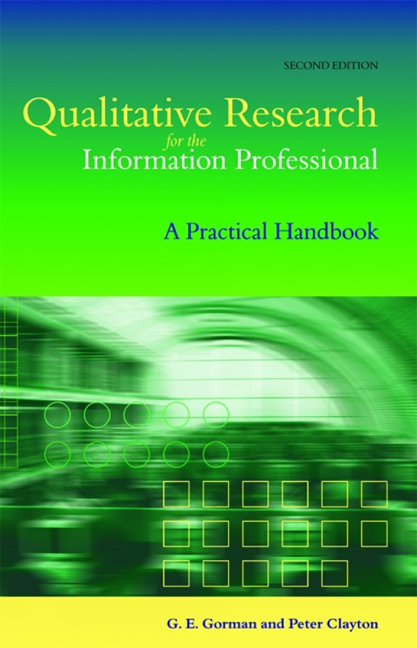Book contents
- Frontmatter
- Contents
- Tables, figures and research scenarios
- About the authors
- Preface to the second edition
- 1 The nature of qualitative research
- 2 Evaluating qualitative research
- 3 Qualitative research design in information organizations
- 4 Case studies in information organizations
- 5 Laying the foundations for fieldwork
- 6 Beginning fieldwork
- 7 Observation
- 8 Interviewing
- 9 Group discussion techniques
- 10 Historical investigation
- 11 Recording fieldwork data
- 12 Analysing qualitative data from information organizations
- 13 Writing qualitative research reports
- 14 Human resources in knowledge management: a case study
- Select bibliography
- Index
2 - Evaluating qualitative research
Published online by Cambridge University Press: 08 June 2018
- Frontmatter
- Contents
- Tables, figures and research scenarios
- About the authors
- Preface to the second edition
- 1 The nature of qualitative research
- 2 Evaluating qualitative research
- 3 Qualitative research design in information organizations
- 4 Case studies in information organizations
- 5 Laying the foundations for fieldwork
- 6 Beginning fieldwork
- 7 Observation
- 8 Interviewing
- 9 Group discussion techniques
- 10 Historical investigation
- 11 Recording fieldwork data
- 12 Analysing qualitative data from information organizations
- 13 Writing qualitative research reports
- 14 Human resources in knowledge management: a case study
- Select bibliography
- Index
Summary
FOCUS QUESTIONS
• Why is evaluation of qualitative research necessary?
• What are the differences between the evaluation of qualitative research and quantitative research?
• Are there criteria specific to qualitative research which should be used in its evaluation?
• How might the evaluation of other people's research affect the conduct of your own?
Regardless of whether we are likely to undertake a research project of our own, these days almost all professionals will encounter qualitative research reports in the professional literature. Unless one is simply to accept that everything published is, in fact, credible – certainly too reckless an assumption for either of us – then some criteria have to be applied to sort the genuinely groundbreaking from the routine, the competent from the flawed. For quantitative research this is, if not easy, at least comparatively straightforward; there are many well-established rules to follow, and guides to their application.
No such well-established rules or universally recognized guides exist for qualitative research. This chapter proposes some that are gaining wide acceptance and suggests how they might be employed.
The importance of evaluation
There are many reasons why an information professional needs to be able to evaluate the quality of qualitative research reports. Perhaps the most apparent is to be able to read one's own professional literature intelligently and quickly – there is no need to waste time reading inadequate work. If you are a manager, should you rely on the findings and recommendations of studies which appear to have been conducted in organizations similar to your own? Few would wish to consider major changes to policies, services or procedures if the study recommending them was itself flawed. For the novice researcher, since research is acknowledged to be cumulative in nature, it is necessary to know whether or not it is safe to rely on earlier work. If you do accept something that is, in fact, dubious, not only will your work be built on inadequate foundations – and hence far more likely to encounter problems – but also if they know or suspect the weaknesses in the work you cite, more expert readers will be inclined to dismiss your own work as similarly flawed.
- Type
- Chapter
- Information
- Qualitative Research for the Information ProfessionalA practical handbook, pp. 20 - 33Publisher: FacetPrint publication year: 2004



